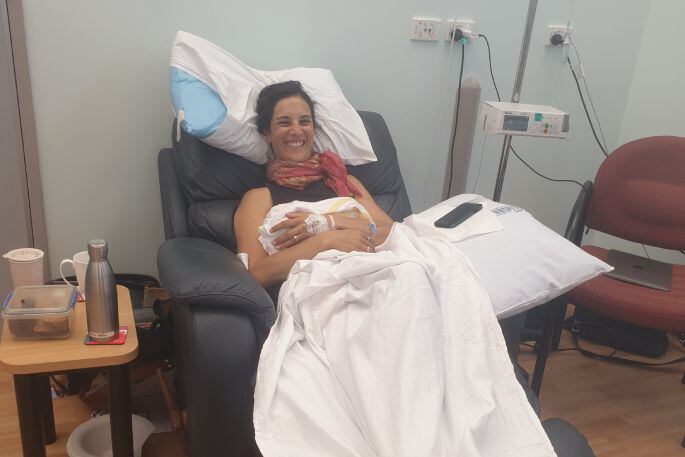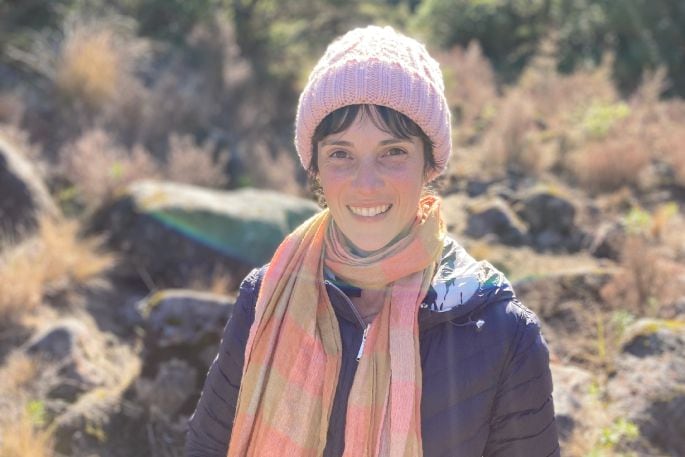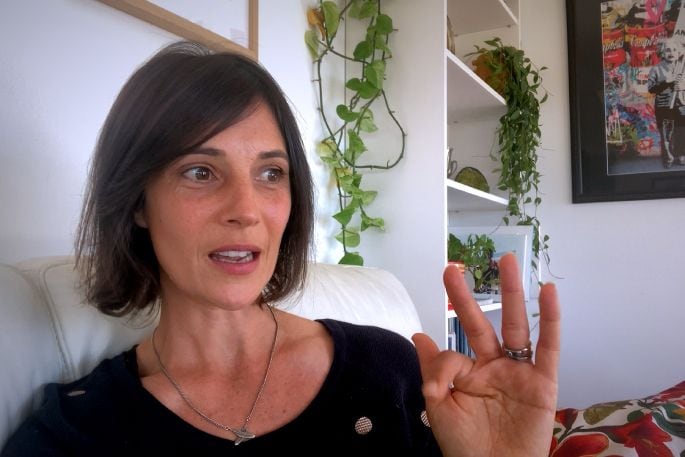“Your white blood cell count is much higher than expected.” That is the sentence that reshaped Kylie DellaBarca Steel’s world in an instant.
“Breathe, Kylie. Just breathe,” she thought.
Then came the life-altering news: “You have chronic lymphocytic leukaemia.” At the time, she was a wife and mother at 40 years of age.
That was in 2022. Now, she’s participating in a clinical trial from where she lives in the Bay of Plenty. Her three sons are aged 5, 10 and 12.
Hoping to encourage, inspire and walk alongside others on this difficult journey, DellaBarca Steel is also sharing her cancer journey on her blog Courage, Love and Legacy, which she said is “a way of reframing my CLL [chronic lymphocytic leukaemia] diagnosis”.
She has recorded a podcast for Parent Place and has just released a video-log series on a leading international cancer care platform, Patient Power.
“It’s such a privilege to put together and share my stories with an international audience, but it has really hit home just how far behind we are with the treatments available for patients in New Zealand,” she said.
“It’s almost embarrassing talking about the first line care we offer patients here, knowing that, for most of the audience, they have access to much better options.”
There are roughly 2,000 CLL patients in New Zealand, with the average age for a CLL diagnosis being between 67-72 years, so DellaBarca Steel is in a rare category.
Less than 5 per cent of people are diagnosed under the age of 50.
While CLL is also known for being slow moving, DellaBarca Steel once again finds herself in a rare category with exponential growth of her lymphocytes in the first 18 months, requiring early treatment.

Kylie DellaBarca Steel is participating in a clinical trial. Photo: Supplied.
“At my first meeting with my specialist he said, ‘usually I say to my patients, the good news is you’re quite likely to die living with this cancer, but I’m sorry that I can’t say the same to you’,” she said.
As this type of blood cancer is currently incurable, she is going to need to rely heavily on the treatment options available in New Zealand to survive until her children reach adulthood.
“Treatment for me is like a hand of cards – each buys a period of remission before I need to play another card.
“My biggest worry is that the treatment options in New Zealand are so far behind the standards available in other countries, and, while Pharmac have a boost of funding, I would like to see this reassessed and changed.”
In June 2024, the Minister of Health Dr Shane Reti announced the Government is allocating Pharmac an additional $604 million over four years to fund or widen access to many more medicines, including cancer medicines.
DellaBarca Steel said her first frustration was that chemotherapy is the standard first-line treatment currently available in New Zealand, while internationally this had been long replaced by more targeted immunotherapies.
“Around the world FCR is not often used any more, with research clearly demonstrating targeted therapies are significantly more effective in providing longer remission times, having less toxicities, and achieving undetectable disease levels.
“Yet in NZ, this dated treatment is still all that is funded for CLL patients as their first ‘card’.”
“I am very grateful that, earlier this year, when facing the very hard decision of inflicting chemo on myself and my young family or trying to self-fund a more targeted therapy, a clinical trial came up just when I needed it.”

Kylie DellaBarca Steel has chronic lymphocytic leukaemia. Photo: Supplied.
She knows others were not as lucky.
“Why we have to rely on clinical trials to gain access to what is standard care in other countries is beyond me.”
“When we look at the social implications and economic savings of targeted treatments, it is completely perplexing to me why Pharmac still primarily fund treatments that have such high impacts and costs on patients’ lives, rather than providing them options that allow them to still fully function as contributing income earners, parents and family members.”
CLL is a relapsing and remitting disease, meaning that access to several treatment options with different modes of action is required to keep people living. Dellabarca Steel feels this is not well-recognised by Pharmac, and is a source of daily concern for her.
DellaBarca Steel said with pharmaceuticals generally underinvested in in New Zealand, it left her with the daily concern and worry about the lack of quality and range of targeted therapies that had been approved as second- and third-line treatments.
“While my current clinical trial is doing a great job of keeping my cancer at bay, in the future, I’m going to need another treatment and another and another and I worry and wonder about what I’ll have access to here in New Zealand.
“For someone my age with CLL, there is a median reduction of life expectancy of nearly 20 years compared with the general population.
“That’s a really sobering thought. It puts my life in the hands of Pharmac and the treatment options they approve – they literally are the ones buying me time with my children.”
DellaBarca Steel said one of the second line treatment patients were currently offered was Ibrutanib, a continuous treatment, which was given FDA approval in 2014 but only approved in New Zealand last year.
Internationally, Ibrutanib has been superseded by newer generations of BTK inhibitors which are reported to have reduced side effects and better remission times than their 10-year-old predecessor.
“If it took New Zealand 10 years to approve what was standard care in other countries, my worry is, how long will it take them to consider the more effective options now available elsewhere?”
“And while other OECD countries seem to be moving ahead with approving other treatment ‘cards’ such as BTK degraders and Car-T cell treatments, all of which offer other lines of treatment and remission, Pharmac has probably decided they just offered one ‘new’ drug last year, so what’s the hurry?”
She said for her and other younger CLL patients here, the concern is their needs are not being considered in the overall approach.
“There’s probably a sense at Pharmac of ‘well we’ve got enough options to get what is generally an older population of cancer patients through their lives’. But what of those of us who are outside the usual demographics – are we just ignored or forgotten?
“Surely, approval is not the same as the cost of treatment.”
Pharmac announced its first cancer medicine decision on September 9, following the funding boost.
“Pharmac has decided to widen access to two medicines for several types of cancer,” Pharmac’s Director of Pharmaceuticals, Geraldine MacGibbon.
Pembrolizumab – branded as Keytruda – will be funded from October 1, 2024, for eligible people with advanced triple-negative breast cancer, head and neck cancer, colorectal cancer, bladder cancer and Hodgkin lymphoma. Nivolumab – branded as Opdivo – will be funded from November 1 for eligible people with kidney cancer.
MacGibbon said Pharmac was really pleased to announce their first decision for cancer medicines since the Government provided additional funding in June to fund medicines for a range of cancer and non-cancer conditions.
DellaBarca Steel is calling for more approval of treatments by Pharmac.
“There might not be many of us needing third- or fourth-line treatments, but what’s the harm of approving them so we can access them if needed?
“Knowing they’re approved and available if we need them is a really big deal, it literally will be a matter of life or death for me.”
Ensuring there is a sufficient range of treatment pathways for younger patients like Kylie is a serious equity issue that she hopes to draw attention to in her international video-log.
“With the boost of funding to Pharmac, I am strongly advocating that blood cancers, and specially CLL, will get another look at and that Pharmac will begin approving newer targeted therapies as first-line treatment, as well as upgrade and broaden the options available for subsequent treatments,” she said.
She is expectantly awaiting a promised Cancer Control Agency Report with specifics to blood cancers, hoping it backs up her experience and thoughts about the future of treatments available.
In the meantime, she will continue to live her life with courage, love and legacy and support and encourage patients like herself on a cancer journey.
- SunLive

